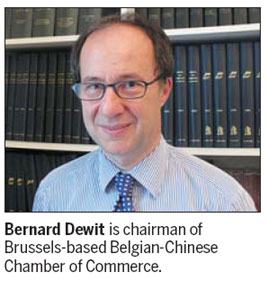Global Biz
Market economy status yet to come
By Fu Jing (China Daily)
Updated: 2010-10-04 09:41
 |
Large Medium Small |
BRUSSELS - China faces an "unpredictable schedule" as to when the European Union (EU) will grant it market economy status, mainly because businesses and some politicians hold different views, said a senior business chamber leader.
However, he said more and more European companies have invested in China and they want China to be given such a status.
"But there are politics within Europe and some in the economic sectors are lobbying their governments to put a brake on it," said Dewit.
But he said he believes the increasing mutual investment and business exchanges will facilitate the process.
 |
On Wednesday, more than 200 leading executives from China and Europe will attend the China-Europe Business Summit during Premier Wen Jiabao's four-country tour in Europe, which is expected to bring multibillion dollar deals to Greece, Belgium, Italy and Turkey.
Dewit said European businessmen want to exchange ideas with their Chinese counterparts on revaluation of the renminbi, further opening up of the Chinese market and the protection of intellectual property rights.
"But I think a main topic should also be sustainable development," said Dewit, who has presided over the chamber since 1996. "Businessmen want to explore more opportunities in the development pattern shift."
China has already made great efforts to develop green energy and achieve sustainable development and it is expected that China will have a more ambitious green economic agenda in the coming five years, Dewit said.
He said resources and energy constraints are the big hurdles to overcome to secure China's development.
He suggested that China should continue to construct nuclear power stations to offer more energy to sustain its rapid growth.
"China is a holder of such technology and it can export the technology of building nuclear power stations to other developing countries," Dewit said.
Water supply, urbanization and the development of the western regions are also priorities for China, he added.
Following the financial crisis, the US and Europe have sought to develop their real economies and in some areas, competition with China will get tougher.
"We have to live with competition, which is good, but the point is that the competition should not kill us," said Dewit.
Apart from trade and investment, Dewit said China has taken steps to encourage investment outward. However, "Europe is not an easy market". Though the EU has rules, different countries have various regulations. "All these have added up to difficulties when the Chinese choose to invest in Europe."
He suggested Chinese investors intending to expand businesses in Europe should enter into closer relationship with locals given Europe's diverse languages and cultures.
However, he said many countries in Europe have already set up investment promotion agencies and investment incentives have been offered. "They welcome Chinese investment."
China Daily



